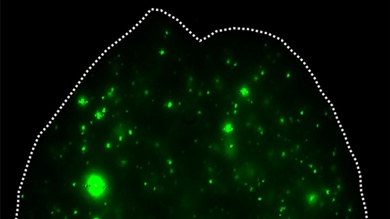Companies seek to diagnose cancer from a blood sample
This is an excerpt of an article that appeared on STAT. Read the full story here.
One way that cells communicate is via microscopic packages called exosomes, which ferry genetic information and key molecules around the body. These tiny packets are now attracting big interest from companies and researchers, who are trying to find ways to diagnose and treat diseases by listening in on these messengers.
Joining the group this week is Codiak BioSciences, which launched Tuesday and hopes to use exosomes to fight cancer and other diseases. The company, which was primarily funded by Arch Venture Partners and Flagship Ventures, is cofounded by Eric Lander, the founding director of the Broad Institute, and will be led by Douglas Williams, most recently the executive vice president of research and development at Biogen.
Exosomes could be used to diagnose cancer because they contain DNA, RNA, and proteins from the cells from which they emerge, meaning doctors can get a glimpse of a tumor’s genetic makeup from just a blood test.
Studying exosomes is “a great way to get a window into what the cells in our pancreas are doing, or our kidneys, or brain,” said Dr. Raghu Kalluri, a scientific founder of Codiak and the chair of cancer biology at the University of Texas MD Anderson Cancer Center, from which Codiak licensed some of its technology.
The technique has shown some early promise. In a paper published this summer in Nature, Kalluri found that measuring the levels of a certain protein in exosomes could distinguish if patients had pancreatic cancer and the severity of the disease.
Codiak, which is initially focused on pancreatic cancer, hopes to create what Williams called a “blood-based biopsy” that could test exosomes to determine if a patient has cancer. The hope is that it could help clinicians catch pancreatic cancer, which is notoriously difficult to detect, at an early stage.
Codiak is also interested in exosomes as a treatment vehicle.
When exosomes arrive at their destination, they bind to cells and expel their contents. If they were loaded with drugs and targeted at cancer cells, they could deliver an attack directly into tumors.
“We are simply co-opting a natural mechanism that already exists,” Williams said.
That kind of treatment would not be ready for years, but other exosome-focused products could be reaching consumers soon.
...
One benefit of exosomes is that researchers can easily gather thousands of them in a blood draw, said Dr. David Lyden, a professor of cell and developmental biology at Weill Cornell Medicine. But, Lyden said, it remains difficult to distinguish exosomes that originated from cancerous cells from those that came from healthy cells.
“Can we improve our detection of cancer exosomes?” Lyden said. “We have to figure out a way to separate those two.”
An added challenge: those cancer exosomes aren’t identical. They stem from an array of genetically diverse tumor cells, so researchers would need to weigh which are the most significant in driving the cancer.
Lyden and other researchers from Cornell and Memorial Sloan Kettering Cancer Center are now comparing patients with pancreatic cancer with patients with noncancerous pancreatic disease in a clinical trial they hope will reveal what “normal” exosomes look like and if exosomes play a role in how the disease progresses.
....




